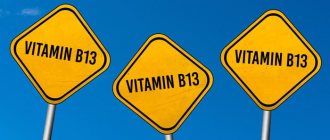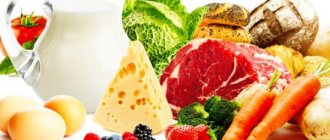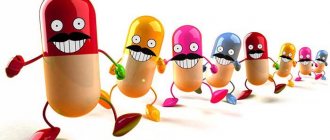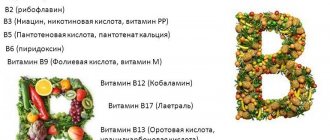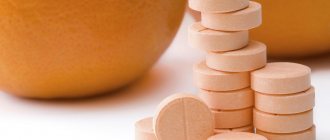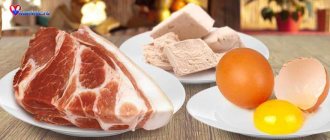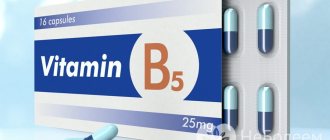Home » Health » Daily value of vitamins and minerals
For normal functioning of the body and its resistance to infections, a person needs to consume sufficient amounts of vitamins and minerals. However, the modern rhythm of life does not always provide such an opportunity. In addition, not all micronutrients (useful substances) come with food. There is a need to take additional vitamin and mineral complexes. You can buy them at any pharmacy; the composition is selected to suit the individual characteristics of the body.
What are vitamins?
They can be divided into two main groups:
- Fat soluble. Over time, they accumulate in the human body, excesses are deposited and can reach a critical level. This category includes vitamins of groups A, E, K, D. They should not be abused.
- Water soluble. This includes all the microelements of group B, as well as vitamin C, biotin and choline. They are characterized by lower concentrations, so they accumulate in the body more slowly.
Essential Minerals
- The first group is phosphorus, magnesium and calcium. Very important for a person to strengthen bones and prevent the destruction of tooth enamel.
- The second group is chlorine, sodium and potassium. Very often they are also called electrolytes. Their use plays a significant role in maintaining the water-salt balance at the required level.
- The third group is zinc, iron, iodine. They are not as important as the minerals of the previous groups, but their deficiency negatively affects the overall health and functioning of individual organs and the production of necessary hormones.
Vitamin deficiency: symptoms
| Vitamin | Symptoms of deficiency |
| A | A lack of beta-carotene is characterized by dry skin, especially in winter. There may also be blurred vision in the evenings. |
| AT 6 | The appetite disappears, the person feels a loss of strength, and becomes absent-minded. In most cases, hair begins to fall out. |
| AT 12 | A slight tingling sensation is felt in the limbs, accompanied by weakness in all muscle groups throughout the day. |
| WITH | Immunity decreases, the body fights the disease poorly and recovers slowly. Appetite noticeably deteriorates, the person feels severe weakness. |
| E | Symptoms appear only in advanced cases. Expressed as a lack of coordination. |
| IN 1 | The body begins to defend itself against infections worse, so the person feels weak and quickly falls ill. |
| AT 2 | The lack of this microelement provokes skin damage. They may appear as dryness, flaking or redness. |
| AT 3 | A person constantly feels tired and weak, hair begins to fall out, and nervousness increases. |
| AT 5 | The person sleeps poorly, feels slightly tired, and feels nauseous. |
To feel good at any time of the year, you need to consume vitamins and minerals, then the immune system will not weaken and the body will resist seasonal infections.
Vitamins for mature men
Having crossed the threshold, the mental, physical activity, well-being and energy of a representative of the strong half of humanity begins to fully depend on how responsible and attentive he is to his own health. In his youth, a guy’s body needs a basic complex of vitamins, the main ones of which are A, B, E. These nutrients are responsible for the production of testosterone, the formation of healthy sperm, and the complete absorption of protein.
Thus, until the age of 40, the male body is aimed at maintaining the health of the reproductive system. At older ages, the quality of absorption of necessary substances decreases, a predisposition to the manifestation of chronic diseases is formed, and visual acuity decreases.
To combat age-related changes, the basis of any vitamin and mineral complex for men should be:
- A – retinol, beta-carotene (1 milligram);
- C – ascorbic acid (100 milligrams);
- E – tocopherol (10 milligrams);
- H – biotin (0.12 milligrams);
- D – ergocalciferol, cholecalciferol (0.015 milligrams);
- B1 – thiamine (4 milligrams);
- B2 – riboflavin (3.5 milligrams);
- B6 – pyridoxine (2.5 milligrams);
- B9 – folic acid (0.45 milligrams);
- B12 – cyanocobalamin (0.025 milligrams).
A sufficient amount of these vitamins in the body reduces the risk of heart disease, osteoporosis, supports male strength, immune function, and vision.
People who abuse nicotine and want to reduce body fat and increase muscle mass should additionally consume foods or dietary supplements that contain lipoic acid (vitamin N). Natural sources of the nutrient: milk, rice, cabbage, beef and liver. The daily requirement for men leading a measured lifestyle is 30 milligrams of lipoic acid. Athletes over 40 years of age who perform endurance exercise should increase their intake to 450 milligrams.
Remember, in adulthood, smoking has a particularly aggressive effect on the liver, and lipoic acid begins to protect the organ, protecting it from the development of hepatitis and cirrhosis.
After 50 years, the risk of developing heart disease and prostate adenoma increases, enzyme systems wear out, immunity weakens, hair begins to turn gray and fall out, bald patches form, bones become brittle, and the number of fractures increases.
To maintain a man’s fading health, it is recommended to consume the freshest, most environmentally friendly foods and greens possible every day. Avoid fried and smoked foods, ketchup, mayonnaise, store-bought juices, confectionery, and canned goods. Prepare dishes correctly, in a “gentle” mode: boil, bake in the oven.
The following multivitamin preparations will not be superfluous to a balanced diet: “Complivit”, “Oligovit”, “Vitrum”, “Velmen”, “Kvadevit”, “Alphabet” for men.”
After 50 years, the microflora in the intestines is disrupted, so at this age it is recommended to use a complex containing live probiotic cultures. They populate the gastrointestinal tract with beneficial bacteria, which improves the absorption of vitamins and increases the tone of the body. These drugs include: “Senior”.
To supply the body with energy, normalize metabolic processes and accelerate the recovery of the immune system after illness, pay attention to the vitamin complexes “Bisk”, “Chromvital+” and “Lamin Vision”.
“Stalon Neo”, “Artum”, “Ursul” will help maintain the health of a man’s genitourinary system. The preparations include vitamins, macro- and microelements, antioxidants, herbal aphrodisiacs that improve erection, fight sexually transmitted diseases, relieve inflammation, increase testosterone production, preventing the development of age-related changes.
The choice of nutrients depends on which internal organs and systems are impaired. Based on the clinical history, the doctor selects a complex of drugs that combine targeted vitamins and general strengthening agents.
Mineral Deficiency: Symptoms
| Name | Impact on the body | Deficiency Symptoms |
| Zinc | Promotes the production of insulin, stimulates the formation of hormones and significantly strengthens the human immune system. | Causeless depression, severe hair loss and frequent colds. |
| Manganese | Maintains the required level of cholesterol in the blood. | Atherosclerosis, high cholesterol levels. |
| Magnesium | It ensures that the human body is always in good shape and removes excess cholesterol. | Mood swings, constant irritability, severe pain in the temporal lobe. |
| Fluorine | Helps strengthen bones, monitors the condition of teeth and tooth enamel. | The gums begin to bleed and I have toothache. |
| Iodine | Kills germs and calms the nervous system. | Lack of iodine in childhood can lead to mental retardation, memory impairment and coordination. |
| Chromium | Participates in carbohydrate and insulin metabolism. | Blood sugar levels increase, which soon leads to diabetes. |
| Sulfur | Stimulates constant blood clotting, helps produce energy reserves for the whole day. | Frequent constipation, high blood pressure and sudden hair loss. |
| Sodium | Maintains acid-base balance in the body. | Frequent stomach pain, constipation (poor digestion of food). |
| Chlorine | Promotes the production of hydrochloric acid. | Low stomach acidity, pain and, as a result, gastritis. |
| Phosphorus | Produces hormones and improves brain activity. | Osteoporosis, inattention, severe fatigue (chronic). |
| Iron | Stimulates blood circulation and monitors the normal functioning of the nervous system. | Anemia. |
| Calcium | Makes muscles more elastic, strengthens the structure of bones and teeth. | Possible cramps, hair becomes dull, nails begin to flake and break. |
| Copper | Allows the body to absorb iron more easily and makes the skin elastic. | Mental disorders, low body temperature. |
| Molybdenum | Monitors the normalization of metabolism, promotes the breakdown of fats in the body. | Constipation, sudden weight gain, stomach pain. |
One of the multivitamins contains minerals of different origins. It is recommended to consume seasonal vegetables and fruits in order to maintain the normal functioning of the body.
Vitamins against baldness
The second most important problem that every second man faces after 30 years (and sometimes even earlier) is baldness (alopecia).
There are many causes of hair loss:
- vitamin deficiency;
- heredity;
- hormonal, age-related changes;
- radiation;
- stress;
- chemotherapy;
- fungi, bacteria, viruses;
- diabetes, anemia, systemic lupus erythematosus.
Most often, a lack of vitamins, macro- and microelements in the male body does not cause baldness, but only spurs and accelerates this process. However, a long-term and systematic deficiency of nutrients responsible for the condition of hair can cause hair loss, which is so disturbing and offensive to representatives of the stronger half of humanity.
The main vitamin responsible for the growth and strength of strands is biotin (H). This nutrient controls the supply of sulfur to the body, improves its absorption, which, in turn, is responsible for the condition of the skin, nails, and hair.
Remember, to maintain the vital functions of the human body, all vitamins are necessary and important, but to solve a specific problem it is worth paying attention to the part of them that is “responsible” for the health of a certain organ/system.
Signs of a lack of vitamin H: rapid greasy scalp, hair loss at first a little, then more and more, the appearance of bald patches.
The problem of alopecia should be solved comprehensively: include in your daily menu medications or food products containing the following vitamins:
- Biotin (B7 or H). Natural sources: beef, spinach, hard cheeses, eggs, cottage cheese, mushrooms. The daily norm is 0.3 milligrams.
- Retinol (A). Accelerates hair growth, supports the vital activity of roots, strengthens hair fiber. In addition, vitamin A eliminates dandruff and oily scalp. The body's daily requirement is 15 milligrams. The nutrient is found in carrots, pumpkin, oranges, apricots, and pork liver.
Remember, vitamins A and E are fat-soluble, so in order for them to be absorbed in the body, they should be combined with fatty foods (vegetables, butter, nuts, avocados, hard cheeses, lard, dark chocolate).
- Ascorbic acid (C). Participates in the production of collagen, which gives elasticity to hair. During the period of baldness, the daily dose of vitamin C intake should be increased to 150 – 250 milligrams.
- Tocopherol (E). Promotes hair growth and strengthens its structure. A lack of vitamin E leads to thinning hair and the formation of bald patches. The daily norm is 25 milligrams.
- B vitamins (B1, B2, B5, B9, B12). They protect the hair from stress, strengthen the roots, saturate the scalp with oxygen, and stimulate the growth of new hairs.
In addition, focal or complete hair loss can occur due to a lack of magnesium, zinc, sulfur, calcium, selenium, and iron in the body.
When your hair starts to thin out, every second counts. To quickly stop the ongoing process, you need to use complex vitamins against baldness and conventional dietary supplements to maintain men's health. Among the drugs of the first category are: “Vitrum Beauty”, “Fitoval”, “Merz”, “Mens Formula”, “Revalid”, “Pantovigar”. The action of these complexes is aimed at strengthening existing hair and activating the growth of new ones by “awakening” frozen hair follicles.
If, after undergoing vitamin therapy, hair loss does not stop, the following methods of treating the disease are used:
- laser therapy;
- mesotherapy;
- PUVA therapy;
- cryotherapy;
- iontophoresis;
- darsonvalization;
- electrical stimulation;
- vacuum massage;
- follicle transplantation;
- leather rollers;
- masks and shampoos;
- cosmetic camouflage;
- folk remedies;
- drugs "Propecia", "Minoxidil" and "Rogaine", which stimulate the functioning of hair follicles and the production of male hormones.
Remember, alopecia is easier to prevent than to treat.
Recommendations to keep your hair healthy and shiny:
- take multivitamin complexes regularly;
- do not injure the scalp;
- do not go out in winter without a hat (sharp temperature changes cause destruction of the bulbs);
- wash your hair with cool water;
- choose a quality shampoo that matches your scalp type.
After washing, it is recommended to systematically rinse your hair with decoctions of hop cones, nasturtium leaves or calendula flowers, coltsfoot.
Who needs to carefully monitor their daily intake of micronutrients?
Risk group:
- The modern rhythm of life cannot always allow you to monitor regular, proper nutrition. A medicinal complex of vitamins and minerals is recommended for every person to take occasionally.
- If a person is actively involved in sports, then his body constantly needs to be fed with energy and useful microelements so that immunity does not decrease.
- For vegetarians. They are at risk because they do not consume meat, which contains many beneficial substances that have an important effect on health.
- Children and elderly people.
- With constant stress.
- When following a diet.
- During pregnancy and lactation. Vitamins and minerals for women (sufficient amounts of them in the body) are very important.
- For chronic and colds.
- People with bad habits (drinking alcohol, smoking).
- For those taking contraceptives and other hormonal medications.
Vitamins and minerals are mainly taken into the body through food, but sometimes it is advisable to take special medicinal complexes to improve your overall health. This recommendation applies to everyone - children and adults. It is especially important to think about health during the period of risk of colds.
Daily requirement for vitamin A
Retinol requirements are expressed in international units (1 IU = 0.3 mcg retinol or 0.6 mcg beta-carotene):
- for children aged between 0 - 1 year: 1500 IU;
- for children aged between 1 - 3 years: 2000 IU;
- for children aged between 4 - 6 years: 2500 IU;
- for children aged between 7 - 9 years: 3500 IU;
- for children aged between 10 - 12 years: 4500 IU;
- for adolescents and adults: 5000 IU;
- for pregnant women: max. 6000 IU;
- for nursing women: max. 8000 IU.
Pregnant women are strongly advised not to consume more than 1800 mcg of vitamin A/day (6000 IU) due to possible negative effects on the fetus .
Still, in the first 6 months of pregnancy, they can consume foods rich in this substance (carrots, sweet potatoes, pumpkin), but they should limit consumption of liver (especially cod and shark) and not take vitamin supplements containing this substance.
Daily value of vitamins and minerals
| Micronutrients | Products | Norm per day (mg) |
| Thiamine (B1) | Cereals, chicken egg yolk, pork meat, chicken offal (or pork). | 2-2,5 |
| Group C | Grapefruit, oranges, lemons. Almost all citrus fruits contain this trace element. | 75 |
| Riboflavin (B2) | Kefir, cottage cheese, sour cream. Meat: rabbit, pork and beef. Vitamin B2 is also found in green peas, onions and dill, buckwheat, eggs and beef liver. | 2-3 |
| Iridoxine (B6) | Chicken offal, potatoes, bananas, yeast. | 3 |
| Group B5 | Seeds, any nuts, seasonal vegetables, all fruits. Also found in fresh meat (vitamin is lost when frozen, boiled or fried) | 10 |
| Folic acid | Cabbage (vitamins and minerals can be found here from almost all groups), green onions, orange, spinach, eggs, potatoes, avocados, leafy vegetables. | 1,5 |
| Vitamin B12 | Fish (low-fat), cottage cheese products, chicken meat, cheese. | 0,005 |
| Group A | Dairy products, fish liver, all greens, tomatoes, pumpkin, carrots, mangoes, oranges. | 1 |
| Group E | Wheat (sprouted seeds or young shoots), olive oil, leafy vegetables, eggs, nuts. | 0,0005 |
| Group K | Chicken liver, green tomatoes. | Produced by the body |
| Vitamin D | Chicken egg yolk, butter, fish oil, cream. | 0,01 |
| Iron | Meat – chicken, rabbit, turkey. If you are looking for vitamins and minerals for your hair, be sure to eat right. You can get enough iron from fresh fruits and vegetables | 60 |
| Iodine | The highest iodine content is in seaweed and other seafood. | 0,2 |
| Sodium | The direct source of sodium is regular salt, which absolutely everyone consumes daily. The microelement can also be obtained by eating fish. | 4 |
| Calcium | Mainly in dairy products. Also found in some fruits (winter pear). | 600 |
| Fluorine | Wholemeal flour and all seafood. | 0,7 |
| Magnesium | Buckwheat, oatmeal, any nuts. | 300 |
| Phosphorus | Meat, nuts, fish, cheese, milk. It is better to consume it with foods containing calcium. This makes it easier for the body to absorb. | 600 |
| Copper | Dried fruits, oatmeal and buckwheat, chicken and beef liver, chocolate, beets. | 2,5 |
The daily requirement of vitamins and minerals presented in the table is calculated for the average person. Sometimes, due to the individual characteristics of the body, the norm may be more or less.
What foods contain vitamin A?
Animal products contain active vitamin A - retinol. Vegetables and fruits contain provitamin A - carotene. After entering the body, it is converted into retinol and absorbed. To get 1 unit of retinol, you need 3 times more provitamin A. Therefore, its main source is animal products.
Most retinol is found in any liver. Per 100 g of product contains retinoids in the liver, mg:
- turkey - 22.6;
- beef - 9.5;
- lamb - 7.5;
- chicken - 4.2.
We recommend reading: Why do women need folic acid and how to take it
The championship is held by fish oil produced from cod liver - 30 mg. Much less retinol, up to 1 mg per 100 g of product in chicken eggs, cheeses, cottage cheese, cream and butter.
Among vegetables and fruits, the leader is carrots (10 mg). The following positions are held by red rowan, parsley, dill, spinach and celery, dried apricots, rose hips, and sorrel.
Getting micronutrients from food
Natural foods contain vitamins, minerals and trace elements that have a positive effect on human health. In addition, there is dietary fiber, which is simply irreplaceable for ensuring normal digestion. These fibers reduce the risk of heart-related diseases.
In order to protect yourself and consume all the necessary nutrients, you should always monitor your diet. The daily bustle does not always allow this to be done, so very often a person feels weak and drowsy (caused by a deficiency of micronutrients).
Vitamin complexes
If the body lacks micronutrients, it is recommended to start taking additional vitamin complexes. Be sure to consult with your doctor to choose the best option for you. There is a very large selection of medications; let’s look at the most popular ones today.
- Vitrum (17 minerals and 13 vitamins).
Helps strengthen the immune system and restore strength. Contains important vitamins and minerals for children and adults. No side effects have been identified, only an allergic reaction may occur if there is an individual intolerance to some components.
- Complivit (11 vitamins, 8 minerals). Increases the body's resistance to bacteria and microbes.
- Duovit. There are complexes for men and women with a different selection of micronutrients in the composition. A balanced drug that prevents the development of heart disease, improves the condition of nails and hair. Relieves stress and increases sexual activity in men.
A properly selected complex of microelements and vitamins replenishes the micronutrient content in the body, improves overall well-being, and relieves fatigue. It is not recommended to purchase medications without first consulting your doctor.
What substances are required for the male body?
The need for vitamins is different for male and female bodies. This is due to physiological characteristics and the presence of a different hormonal spectrum. Drugs should be selected individually, since it depends on lifestyle, the presence of chronic diseases, nutrition, age, etc. Vitamins can be water- and fat-soluble.
Vitamin A is responsible not only for skin health, but is also involved in the synthesis of testosterone.
The latter, necessary for men's health, include:
- Vitamin A. Often called the “king of skin.” It stimulates the regeneration (healing) of the epithelium. Vitamin A ensures the synthesis of rhodopsin, necessary for twilight vision, in the retinal receptors. Participates in the production of male sex hormones (testosterone), in the synthesis of taurine (improves nerve conduction, energizes).
- Vitamin D. Provides regulation of calcium and phosphorus metabolism in the body. A normal balance of calcium and phosphorus ensures properly formed and strong bones and strong muscles. Moreover, both skeletal (biceps, triceps) and smooth muscles of internal organs work worse without a sufficient supply of vitamin D.
- Vitamin E. It is considered a “fertility vitamin,” but men desperately need it, because it participates in the regulation of lipid (fat) metabolism in the body and strengthens the walls of blood vessels. That is, it prevents the development of atherosclerosis, which is the main cause of coronary heart disease (mortality from heart pathologies in men in Russia ranks first).
- Vitamin K. A compound involved in the formation of several blood clotting factors. If there is insufficient production of at least one, the likelihood of bleeding increases.
B vitamins are essential for the functioning of the brain and central nervous system.
Water-soluble compounds include:
- Vitamin B1. Necessary for proper brain function, improving memory and attention.
- Vitamin B2. Required for faster healing of wounds, synthesis of hemoglobin and erythrocytes (red blood cells).
- Vitamin B6. Participates in the synthesis of substances that stimulate the nervous system (dopamine, adrenaline, serotonin) and inhibit it (GABA), i.e. it ensures a balance in the flow of impulses throughout the nervous system.
- Vitamin B12. Needed for proper formation of red blood cells. With its deficiency, severe anemia develops, which is manifested by damage to the digestive and nervous systems, including impaired mobility.
- Vitamin C. Important for protecting the body from infections, strengthening blood vessels, and increasing the male body’s resistance to stress.
Zinc is one of the most important microelements needed by every man, because it is involved in the production of male sex hormones.
The important minerals are:
- calcium;
- phosphorus;
- iron;
- magnesium;
- iodine;
- fluorine;
- zinc;
- potassium.
To ensure the functioning of the body, it is necessary to receive all vitamins and minerals in the required concentration.
